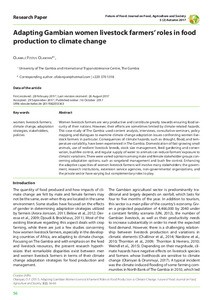Datum
2017-10-16Autor
Olaniyan, Olawale FestusSchlagwort
630 Landwirtschaft, VeterinärmedizinMetadata
Zur Langanzeige
Aufsatz

Adapting Gambian women livestock farmers’ roles in food production to climate change
Zusammenfassung
Women livestock farmers are very productive and contribute greatly towards ensuring food security of their nations. However, their efforts are sometimes limited by climate-related hazards. This case study of The Gambia used content analysis, interviews, consultative seminars, policy mapping and dialogues to examine climate change adaptation issues confronting women livestock farmers in particular. Consequences of climate hazards, such as drought, flood, and temperature variability, have been experienced in The Gambia. Domestication of fast-growing small animals, use of resilient livestock breeds, stock size management, feed gardening and conservation, bushfire control, and regular supply of water to animals can reduce farmers’ exposure to climatic variations. There were varied opinions among male and female stakeholder groups concerning adaptation options, such as rangeland management and bush fire control. Enhancing the adaptive capacities of women livestock farmers will involve many stakeholders: the government, research institutions, extension service agencies, non-governmental organizations, and the private sector have varying but complementary roles to play.
Zitierform
In: Future of Food: Journal on Food, Agriculture and Society. Witzenhausen : University of Kassel, Department of Organic Food Quality and Food Culture. - Vol. 5, No. 2 (2017), S. 56-66Zitieren
@article{urn:nbn:de:hebis:34-2017082853363,
author={Olaniyan, Olawale Festus},
title={Adapting Gambian women livestock farmers’ roles in food production to climate change},
year={2017}
}
0500 Oax 0501 Text $btxt$2rdacontent 0502 Computermedien $bc$2rdacarrier 1100 2017$n2017 1500 1/eng 2050 ##0##urn:nbn:de:hebis:34-2017082853363 3000 Olaniyan, Olawale Festus 4000 Adapting Gambian women livestock farmers’ roles in food production to climate change / Olaniyan, Olawale Festus 4030 4060 Online-Ressource 4085 ##0##=u http://nbn-resolving.de/urn:nbn:de:hebis:34-2017082853363=x R 4204 \$dAufsatz 4170 7136 ##0##urn:nbn:de:hebis:34-2017082853363
<resource xsi:schemaLocation="http://datacite.org/schema/kernel-2.2 http://schema.datacite.org/meta/kernel-2.2/metadata.xsd"> 2017-11-01T11:28:51Z 2017-11-01T11:28:51Z 2017-10-16 2197-411X urn:nbn:de:hebis:34-2017082853363 http://hdl.handle.net/123456789/2017082853363 eng Department of Organic Food Quality and Food Culture at the University of Kassel, Germany and Federation of German Scientists (VDW) Urheberrechtlich geschützt https://rightsstatements.org/page/InC/1.0/ women livestock farmers climate change adaptation strategies stakeholders policies 630 Adapting Gambian women livestock farmers’ roles in food production to climate change Aufsatz Women livestock farmers are very productive and contribute greatly towards ensuring food security of their nations. However, their efforts are sometimes limited by climate-related hazards. This case study of The Gambia used content analysis, interviews, consultative seminars, policy mapping and dialogues to examine climate change adaptation issues confronting women livestock farmers in particular. Consequences of climate hazards, such as drought, flood, and temperature variability, have been experienced in The Gambia. Domestication of fast-growing small animals, use of resilient livestock breeds, stock size management, feed gardening and conservation, bushfire control, and regular supply of water to animals can reduce farmers’ exposure to climatic variations. There were varied opinions among male and female stakeholder groups concerning adaptation options, such as rangeland management and bush fire control. Enhancing the adaptive capacities of women livestock farmers will involve many stakeholders: the government, research institutions, extension service agencies, non-governmental organizations, and the private sector have varying but complementary roles to play. open access In: Future of Food: Journal on Food, Agriculture and Society. Witzenhausen : University of Kassel, Department of Organic Food Quality and Food Culture. - Vol. 5, No. 2 (2017), S. 56-66 Olaniyan, Olawale Festus </resource>
Die folgenden Lizenzbestimmungen sind mit dieser Ressource verbunden:
Urheberrechtlich geschützt

